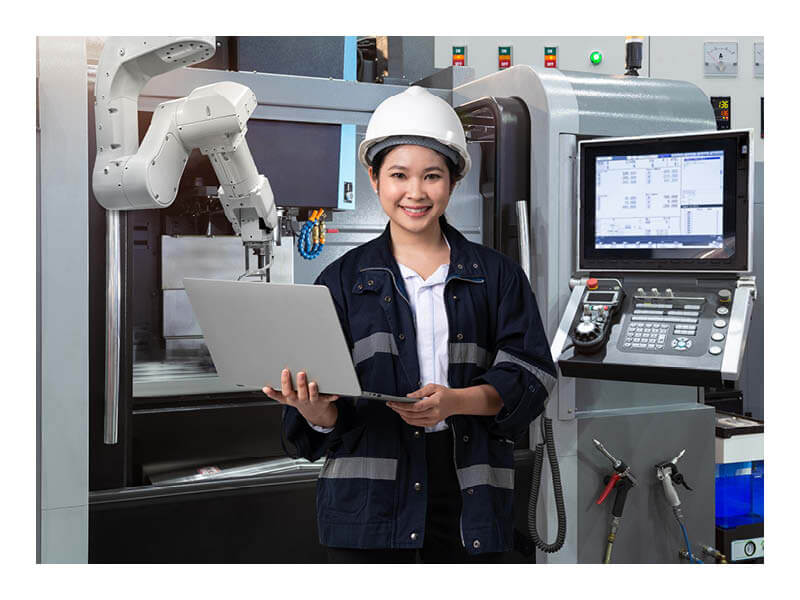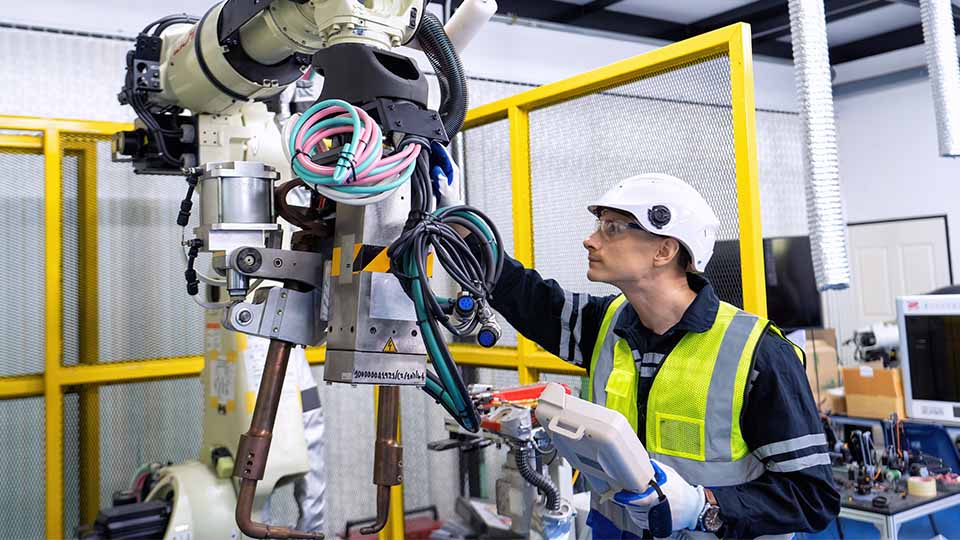The industrial automation landscape is changing so rapidly that even highly experienced engineers can get left behind if they do not enhance their skills regularly. Whether you’re a seasoned automation professional or a newcomer to the automation industry, this article is your go-to resource for comprehensive automation training.
What is industrial automation training?
Industrial automation training can be done on-site or online classes with an instructor. Many companies also offer industrial automation training classes where students come to their facility to learn new technologies and become experts in their automation industry.
It would be fantastic if our brains had a download now button to access new skills and knowledge. Scientists have yet to create breakthrough brain technologies like Neuralink to accomplish this feat. Having employees trained often on your industrial automation equipment can significantly advantage any organization [1].

How can industrial automation training support your business?
Your company may be expanding too quickly, so your industrial automation training may need to catch up with the growth pace. Training employees is essential, even from different states or other parts of the world. Companies must try everything they can to ensure each employee receives an engaging and relevant training experience that will result in a positive return on their investment.
Most industrial automation training is cost-effective and offers flexible solutions for staff training. Usually, industrial automation training classes last one week at the training facility, or if an instructor can come to the client, it can last longer. That one week of training can help your automation engineers and automation technicians for years to come, as the automation engineer can help teach new staff members how to operate the automation equipment or industrial robots.
Types Of Industrial Automation Training:
There is an unprecedented advancement in industrial applications, automation equipment, robotics, and control systems. This demand for people to support, install, and design these systems has never been more significant. Below are the different types of industrial automation training programs.
Robot Programming Training
Students will learn beginner, intermediate, or advanced training in robot courses. The classes are hands-on, and the students must have a teach pendant for moving the robot’s axes. They must learn how to program from scratch and touch-up points. Some robotics courses may offer 3D simulation modeling software and how to zone the robots properly.
Controls Engineering / PLC Training
Programmable logic controller (PLC) training can range from beginner to expert, depending on the student’s prior knowledge and experience. PLC training courses will teach students to define ladder logic. They will write a ladder logic program using a PLC system and software. They will examine on/off and understand the purpose of latching relays. The PLC programming courses will also explain bit status flags.
Automation Technician Training
These courses will describe the role of automation in manufacturing. They will review the types of industrial automation and the equipment used in the industry. This industrial automation course will show the benefits and disadvantages of industrial automation. The automation technician will learn essential computer programming functions and understand the controls of the automation equipment.
Electrical Automation Training
Students in this course will learn the electrical systems or components used in process automation. They will learn about process control, industrial control boards, and human machine interface (HMI) boards. This course will also cover sensors, actuators, relays, circuits, fiber optic systems, motor control, load cells, temperature gauges, and solenoids.
Software Training
Multiple types of software training courses include:
- Vision systems: In this course, a student will learn the steps vital for a vision system to process data. They will learn how to calculate the field of view required for the system to process information.
- 3D modeling: The course will show students the basic techniques used with 3D modeling. Students will create 3D models that represent automation cells. They will learn to transfer the model data into automation equipment and cell layouts.
- Touch Sensing: Students will learn the programming functions of touch sensing. They will learn the necessary characteristics of touch sensors.
Distributed Control System (DCS)
Students will learn why algorithms are widespread in DCS or how to use HMI in DCS for a practical application. In the course, students will learn the purpose of a local area network (LAN). They will identify the components of quality of use in an HMI. Plus, the students will compare software-based alarms to hardware alarms.

Benefits Of Industrial Automation Training:
Employees can earn the many benefits of automation skills through training. Proper training also makes it easier, cheaper, and more efficient for businesses to run their production lines.
Saves The Company Money
You’ll lose money by not properly training or developing the organization’s engineering staff. Then, weeks or months later, another hire (or group) arrives, and the onboarding process begins for the new team members. They will need training to become more familiar with the automation equipment.
However, suppose your current employees are efficiently trained with the automation systems. In that case, they can teach the new hires how to use the automation equipment, and the company will not have to pay for further training every time new employees join the organization.
Helps Companies Understand Their Employees’ Learning Needs
It is no secret that job roles and tasks are constantly changing. Employees must be able to learn new skills and have the knowledge required for those new skills at their fingertips. Traditional training methods only sometimes allow for Just-In-Time learning. Employees are often required to request training time off and then wait to receive it.
Help the company identify learning needs with employee training, drawing on insights from work performance data, production line efficiencies, and online assessment results. You can quickly assign suitable training courses to help achieve better operations. As a result, you’ll ensure that every employee receives the automation knowledge and skills they need to perform their jobs.
Increased Product Efficiency
Product consistency is a highly challenging aspect of a company’s workforce. No matter the number of employees that undergo the automation training, ensuring they all receive the same content and delivery is essential. Employees could make costly errors if not properly trained.
Training is a great way to ensure that your employees receive the same content and instruction regardless of their technical skills or where they may be in their career development. Suppose all of the employees understand how the automation equipment functions; they will be able to troubleshoot production issues faster, decreasing downtime and increasing the throughput of the product. Adequate training means fewer costly mistakes or misunderstandings and a more knowledgeable workforce.
Saves The Company Time
A properly trained automation technician or maintenance technician will save an organization’s downtime. If the workforce knows how to fix automation issues quickly, the company will see a massive increase in production. A well-trained staff could save hundreds, if not thousands, of hours per year in fixing problems in a manufacturing facility.
Keeps The Employees Engaged
It is essential to keep staff engaged and interested in their career. Most employees do not want to feel like their job has become stagnant. Human nature is to be curious, and most people want to learn. Employers who continuously push their employees to become better than the day before ensure that their employees have a meaningful, engaging, and rewarding career experience.

Why do employees like industrial automation training?
Below I will describe the top reasons why employees would like industrial automation training.
Employee Recognition Increases Training Engagement
It is essential to choose a training program that offers certifications or gamification. You can use these tools to create badges, points, levels, and leaderboards that reward employees for reaching certain milestones [2]. Recognizing your employees will increase completion rates and keep your employees motivated.
Employees should also receive a certificate when they complete their courses. Training will encourage staff to continue their studies. This recognition is easy for your business when the automation systems are used effectively. This recognition will increase their confidence and help them become better employees for the organization.
Employees Become More Self-Driven
Different engineers learn at different rates and can require other teaching techniques. Each employee is unique and has different learning styles. Staff will be more inclined to engage in training if it is convenient and relevant. Training programs are a great solution to push people to become more self-driven.
Employees who learn at their own pace during training feel like they are pushing themselves instead of the organization demanding they learn something new. Many new training programs allow employees to unlock the next course after completing the previous class. If your employees are the ones who drive their learning journey, they are more likely to enjoy and retain the training content.
Employees Will Provide Training Feedback
While in a training course, nothing is worse than figuring out if you are on the wrong path. If the materials are irrelevant to your automation equipment or the training material needs to be more intuitive, then the automation staff will not be engaged in the course.
Each student participating in the training course will provide feedback about the class. The more feedback you receive on the course, the better by using surveys or talking with each employee. Most likely, employees will be quick to say if the course was not beneficial, lacked information, or needs to be up to par with the training they were expecting. Feedback will help the organization quickly change training providers or update their classes.
Increases In Salary
Learning new technical skills like PLC programming or robot programming can significantly enhance your professional profile, leading to potential salary increases. Employers value workers willing to learn new skills, especially in a demanding field like automation. Employees participating in industrial automation training become a strategic asset to the company and can help implement automation solutions. This is a significant value add for the company, so most are willing to pay more for these roles, especially if they can promote from within an organization.
Industrial Automation Training Courses:
Below I list the different types of automation training courses and the companies and universities that provide these services. These are some of the top places to get training or an education.
Onsite Automation Training Courses:
If you are looking for hands-on training check out these options for robot and PLC programming.
| COMPANY | TYPE | BRAND | COURSE LENGTH |
| Lincoln Electric | Robot Programming | Fanuc | 5 Days |
| TW Controls | PLC Programming | Allen-Bradley | 5 Days |
| Think-PLC | PLC Programming | Siemens | 5 Days |
| Global Automation Training Solutions | Robot / PLC Programming | Omron / Mitsubishi / Rockwell / Mitsubishi | 5 Days |
Online Automation Training Courses:
If you do not have time for traditional training options, check out these online training programs to enhance your robot and PLC programming skills.
| COMPANY | TYPE | BRAND | COURSE LENGTH |
| Automation Training | PLC Programming | Allen-Bradley / Siemens / Wonderware / Schneider / Mitsubishi / Beckhoff / Omron | 1 – 5 Days |
| MyPLCtraining | PLC Programming | Allen-Bradley | 20-80 Hours |
| SolisPLC | Robot / PLC / HMI Programming | Fanuc / Siemens / Allen Bradley / PLCnext / Cognex / Codesys PLC | 20-80 Hours |
| Interconnecting Automation | PLC Programming | Into PLC Programming | 1-5 Days |
Industrial Automation College Courses:
Below are some of the best college courses in the United States that offer degrees for students trying to get into industrial automation.
- Cincinnati State | Cincinnati, OH
- Oakland Community College | Auburn Hills, MI
- Macomb Community College | Macomb, Michigan
- North Central Technical College | Wausau, WI
- Hawkeye Community College | Waterloo, IA
Industrial Automation Coaching:
If you are an engineering professional interested in growing your career in robotics or just beginning your career in robotics, check out Learn Robotics. With their coaching program, you can upgrade your career in the robotics industry in 90 days or less.
Sign up for a 12-minute training video to find out how to maximize your career by upgrading to a $100k – $200K career in automation!
Industrial Automation Training Conclusion
Many types of industrial robotics or automation training courses are available, and the market will continue to grow as more companies start using automated processes in many different industries. Companies can do training courses or employ outside help when training their employees. Industrial automation training will improve the talent of your workforce and increase the company’s production efficiency.
If your organization is looking for an engineering services company to provide skilled automation trainers, see how JOINER Services can help deliver the teachers your business needs.

Contact them today to learn more!
FREQUENTLY ASKED QUESTIONS
Below, I describe some FAQs about industrial automation training.








